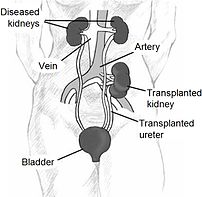
[amazon_link asins=’0998198404,B071FRPBCZ,1449568394,B00BKNAOL6′ template=’ProductCarousel’ store=’finmeacur-20′ marketplace=’US’ link_id=’85dda5cb-4fe5-11e7-bf56-dd96d881794a’]
People who decide to donate a kidney to their near and dear ones need not fear any long term implications as donation has no negative impact on donor’s general health, say experts. Donors can lead a perfectly normal life and, on the contrary, are benefitted psychologically, having the satisfaction of saving a life, they add. Similar observations have been made by a study done in puerto rico which has been reported in the transplantion proceedings . People with one normal kidney can lead a perfectly nomal life and in fact one in 1,000 people are born with single kidney, Dr. S. C. Tiwari, professor at the department of nephrology at aiims, said. Hence, mortality for donors is same as for normal people with there being hardly any chance of death because of complications arising out of donation, he said. Tiwari said the institute, where on an average two kidney transplants are performed in a week, did not have a policy of keeping a track of kidney donors.
………………………..CLICK & SEE
However, recipients, who usually come for health follow up regularly, are enquired about the health of donors, generaly related to them. The only difference a donation makes for donors is that their remaining kidney is under more pressure as it has to work for the whole body. thus, donors are asked to live a regulated life and control their diet, blood pressure and physical activity so that work load on kidney does not exceed, Tiwari said. till three months after donation, donors’ single kidney remains hypertrophy, which reflects that it is coping with entire body’s load, and then it adjusts, Tiwari said.
During these three months, the donors are supposed to take special care. One significant outcome of kidney donaiton is that donors have a sense of “eternal satisfaction” for contributing to the life of a relative, he added. The opinion on kidney donation is strengthened by the study, carried out under the puerto rico renal transplant programme, an academic programme based in an affiliated community hospital, in puerto rico.
The study, based on a documentation of the long-term health of live kindney donors, said that in general the health after many years of donation reflects more or less the health of the general population, stressing that kidney donation is a relatively safe procedure with little morbidity and no mortality in the majority of cases. Risk of mortality is estimated to be 0.03 per cent while acute complication rates vary and are relatively low at eight per cent in places with vast experience in living donation, it said. the puerto rico study involved follow up of the health of 20 donors who had donated their kidney 20 years ago or more.
The donors were interviewed and subjected to a complete history and physical examination, including blood pressure and urine analysis, the report said. of the 20 donors, 12 were females and eight males. the donors were in the mean age of 61 years. Significantly all the donors expressed happiness over donation, the report said. in terms of health parameters, the donors had normal urine analyses, excluding one, a 73-year-old woman who had donated kidney to her daughter, who had persence of protein in urine (proteinuria), the report said adding the woman had developed de novo diabetes. Five of the 20 donors developed de novo hypertension at least 10 years after the donation.However, all of them had a strong family history of hypertension, it said. however, donors had elevated levels of creatinin, a product of muscle breakdown, in their serum and lower creatinin clearance by kidneys.
The report said that though it indicated reduced kidney function, the increase in serum creatinin was not significant. Tiwari said that at aiims he had not seen any donor having a creatinin level, which has caused any problem. Dr. D. S. Rana, a nephrologist at the ganga ram hospital, said that creatinin level sometimes increases in marginal donors – donor who are aged (above 65), or have mild hypertension, or have slightly abnormal kidney function. All these are contraindicaitons for kidney donation, but such people are sometimes accepted as donors when no other suitable donor is available, rana said, adding even such donors do not carry any major risk. If raised levels of creatinin are observed, patients are asked to avoid high protein diet, rana said. during the donation surgery also, donors are not at an additional risk. The risks are same as in any other surgery.
Sources: The Times Of India
Related articles by Zemanta
- Kidney Disease Takes a Growing Toll (nytimes.com)
- Know About Kidney Disease Complications (articlesbase.com)
- Mother donates kidney to her son (mervsheppard.blogspot.com)
- Kidney Failure and Its Treatment (articlesbase.com)






![Reblog this post [with Zemanta]](https://i0.wp.com/img.zemanta.com/reblog_e.png?w=580)










